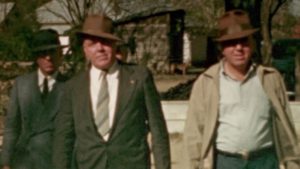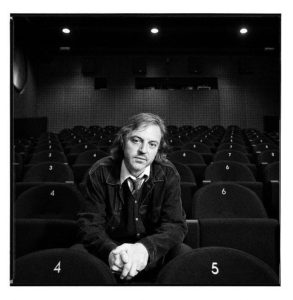Travis Wilkerson, Did You Wonder Who Fired the Gun?
T H E U N S E E N F E S T I V A L
Troubled by a story about his great grandfather S.E. Branch’s involvement in the murder of an unarmed black man named Bill Spann in mid-century Alabama, filmmkaer Travis Wilkerson traveled to the small town of Dothan to investigate the rumours. What he found, and what we watch and listen to him deliberate upon, was not news of a single murder, but an entire history of racism and brutal violence against the local black community. Branch, he discovers, was an outspoken bigot linked to multiple instances of violence and abuse against black men and women. With only a pair of vague news clippings and Spann’s death certificate as evidence, Wilkerson proceeded to trace the entwined fates of the Branch and Spann families.
What we witness in Did You Wonder Who Fired the Gun? is both the documentation of that investigation, played out on screen via home movies, vintage photographs, historical documents and newly shot footage of the filmmaker’s travels (which eventually take him to Spann’s unmarked grave), as well as the role Wilkerson himself plays in the excavation and personal recrimination of the murder, almost 70 years on. Wilkerson himself provides live voiceover narration while seated in front of a laptop. The futility of this quest is the crux of the film and the aspect of the project that most plagues Wilkerson, whose narration is in a constant state of second-guessing, self-indictment, and flat-out shame at the extent of the atrocities. “This isn’t a white saviour story,” he begins, cautiously. “This is a white nightmare story.”
When, in the course of his research, Wilkerson discovers that his mother’s sister is a practising white supremacist, the film takes on an increasingly disturbing urgency. Seated in front the screen, unable to divorce himself from his own complicity in this ongoing story, Wilkerson forcefully prompts one of the most powerful reckonings in recent American cinema. Watch a trailer.
Video. Color/Sound. 2017. 88 mins.
This film will screen as part of The Unseen Festival at Counterpath on Friday, September 29, 2017.
A chance meeting in Havana with legendary Cuban film propagandist Santiago Alvarez changed the course of Travis Wilkerson‘s life. He now makes films in the tradition of the “third cinema,” wedding politics to form in an indivisible manner. In 2015, Sight & Sound called Wilkerson “the political conscience of American cinema.” His films have screened at scores of venues and festivals worldwide, including Sundance, Toronto, Locarno, Rotterdam, Vienna, Yamagata, the FID Marseille and the Musée du Louvre. His best-known work is an agit-prop essay on the lynching of Wobbly Frank Little called “An Injury to One,” named one of the best avant-garde films of the decade by Film Comment. His most recent fiction feature, “Machine Gun or Typewriter?” premiered at Locarno 2015 and was awarded Best International Feature at DokuFest (Kosovo). It has since screened worldwide and was recognized as one the finest films of the year on numerous lists including La Furia Umana and DesistFilm. His writings on film have appeared in Cineaste, Kino!, and Senses of Cinema. He has taught filmmaking at the University of Colorado and Film Directing at CalArts, and was the inaugural Visiting Fellow of Media Praxis in the Pomona College Media Guild. Presently, he is a Visiting Assistant Professor of Film at Vassar College. He is also the founding Editor of Now: A Journal of Urgent Praxis.


